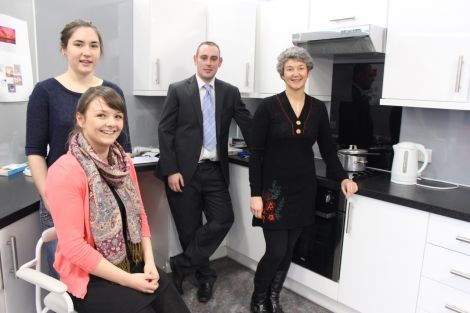News / Boost for independent living hit squad
A COMMUNITY care hit squad that helps old folk regain their independence is recruiting permanent staff to help it expand the service beyond Lerwick.
Since being set up four months ago, the six staff in the Rapid Response Intermediate Care (RRIC) team have helped 17 people live at home who would otherwise be in hospital or a care centre.
The health board and council see the team as key to reducing the cost of keeping people in care or hospital, while offering the elderly a better quality of life.
For the past year Shetland has had an average of eight people stuck in hospital even though they are ready to be discharged.
With the cost of keeping someone in a hospital bed running at £572 per day, the total has amounted to almost £1.8 million in 2014 alone.
NHS Shetland and Shetland Islands Council are working hard at finding ways to reduce delayed discharges as much as possible, with RRIC showing the most promise right now.
The RRIC approach differs from standard care-at-home support work by drawing up a six week plan to help people look after themselves and live a full life at home with minimal support.
“One of the big differences is rather than delivering a set care package over a long period of time, we go in and deliver a short term, goal-based, planned intervention,” Jill Beswick, one of the team’s two occupational therapists, explained.
This plan can cover everything from helping people go shopping and make their own meals to providing emotional support to the individual and their family, and reintegrating them into their community.
“We go in to see the person up to four times a day – its usually very intensive initially and then we pull back as someone becomes more independent,” Beswick said.
Become a member of Shetland News
The RRIC team has been funded by central government until March 2016 with money for 12 people to work round the clock, seven days a week throughout the Shetland mainland.
However difficulties recruiting staff to temporary contracts when there are so many oil industry jobs on offer in Shetland have left them short of five and a half support workers and one physiotherapist, despite three attempts to recruit.
This week the Shetland Health and Social Care Partnership acknowledged that offering temporary contracts was dissuading people from applying to join the team.
As a result the SIC’s social services committee approved a proposal to offer new staff permanent contracts, on the basis that if long term funding fails to materialise they will be absorbed elsewhere within the community care department.
Since September the RRIC team has helped 17 people in Lerwick stay in their own home, with only one 98 year old having to return to care after becoming ill.
However 10 people who were referred to them could not be helped, half of whom were rejected purely because of staff shortages or because they lived outside Lerwick.
Chief community nurse Edna Mary Watson said there had been nothing but positive feedback from patients about the team’s work.
She added that the RRIC team cost about one quarter of the price of keeping someone in hospital or a care home.
“It’s been a very difficult period for this team, but they are doing a remarkable job despite the limited resources,” she told the committee, saying that she hoped the service could be extended to cover the whole of the islands.
Committee vice chairman Gary Cleaver said RRIC could be “one of the absolute cornerstones” for keeping people living as long as possible in their own communities.
“We have no option but to support this,” councillor Allan Wishart said.
Become a member of Shetland News
Shetland News is asking its many readers to consider paying for membership to get additional features and services: -
- Remove non-local ads;
- Bookmark posts to read later;
- Exclusive curated weekly newsletter;
- Hide membership messages;
- Comments open for discussion.
If you appreciate what we do and feel strongly about impartial local journalism, then please become a member of Shetland News by either making a single payment, or setting up a monthly, quarterly or yearly subscription.






























































